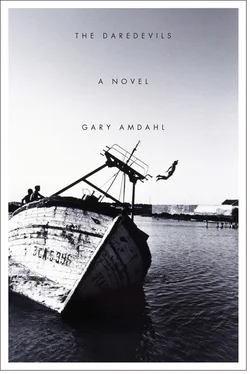“Though playgoers lined the sidewalk the length of the Garden, went around the block and nearly the length of its other side, most of them, assevering poverty or union brotherhood, would get in for pennies, or without charge, if they were Paterson silk workers not appearing in the show. The pageant’s backers, Jules told us as we stood in the park across the street, had been depending, in the face of sky-high — we all looked up involuntarily at the statue of Diana — Garden rental fees, on subscription and the selling out of the pricier stalls to intellectual sympathizers with money. These sympathizers had not been as forthcoming as had been hoped, and Jules said the backers reckoned that they would probably not break even. Worse, it was looking like he was being left holding, so to speak, the books: bills had been left unpaid, and while some vendors and lenders would be happy to write their losses off in a good cause, some would not. There wasn’t much he could do, but it looked like he would have to deal with the part that wasn’t any fun. I said that that was because he was a good, kind, decent man who could not help but do such things for the welfare of others. He sat down on a bench that was out of the lamplight they’d been standing in, and Rosemary instinctively sat down next to him, held his arm and snuggled close. She liked him, and that was all there was to it. I think she knew I loved him, but she liked him, and when she liked people, she showed it. For his part, Jules liked nearly everybody he met, but felt he would, without thinking, risk his life, just like that, for Rosemary. How could I discredit such a feeling? Why would I? And, again, without thinking or any sort of articulation, he was confident that the feeling was reciprocal. It was simply the kind of man he was. Was he a daredevil? Not in any way that you would notice. Was he handsome? Yes, but not incredibly so. Was he charismatic? No. But I loved him. His eyes were kind and intelligent and he was not afraid to suffer, not afraid to die. And here is where I began to see things, as it were, peripherally. Nothing bore in on me. I could see everything floating past me but focus on nothing. Even perfectly clear shapes very near did not startle or impinge on me. They moved at ordinary speed, but seemed to drift and were quietly making ordinary noises. I could see things very far away and it was soothing to have it all so far away. It was something like being high, but I wasn’t, and I was glad I wasn’t. All three of us had fallen silent, listening to the shouts across the street. Once most of the crowd was inside and the Pageant had begun — you could hear the first choral shouts even in the park — we made our way with a small hand truck from the shipping dock to the tower lift. From the hand truck to the lift we moved four big boards holding red-painted electric light bulbs, a roll of electrical cord, and a little leather satchel of tools. We appeared to be handling scenery and to be involved in ordinary stagecraft; the people milling about didn’t give us a second look as we closed the iron-grill doors of the lift’s little car and set off, rattling and banging our way upward. We passed up through many floors in the darkness of the elevator shaft, but came suddenly to the Parthenon-like summit of the tower’s first twenty floors, and glimpsed, through the massive columns, the little streams of light flowing into the vast darkness beyond Central Park. Slowing and swaying and creaking, we went up another fifty feet into a once-again-closed dark space, that looked something like a miniature neoclassical bank or government building, the lift coming to a loud banging stop at its roof, which was the floor of the first of three, successively smaller balconied arcades, the last of which was the lantern, on top of which Diana rested and turned. We would have to climb narrow circular stairs now, with our awkwardly big and increasingly heavy light boards, each of the four six feet by three. Halfway with the first board, Rosemary, going first, said oh no sharply, and slipped. Though all she did was sit heavily, the board came down with a crack on the top of her skull, and I was jolted backward. I let go of the board with both hands to grab the handrails, and somehow managed to hold the board on the rack of my arms and shoulders while it pressed into my throat. It was as if I were standing before the carder with an immense weight choking me. Rosemary struggled to her feet and quickly pulled the board up so that I could breathe. Satisfied that we were all right, we made our way slowly and carefully up to the lantern. We propped the board against the balustrade, and waited for Jules, who was carrying the second by himself. Then we went down for the third board. Halfway up, the same thing happened again: the step was somehow irregular, or slick, and Rosemary, careful as she could be, slipped. She made the same sharp sound, and I, hearing something this time in the intake of breath just before the cry, was able to ready myself, hunching my shoulders to protect my throat. Up in the lantern we panted and waited for Jules and the last board. Rosemary then went down and came back up with the electrical cord, and Jules set about cutting, separating, and splicing it. Then without a word she went through one of the window arches onto the ledge, a good wide ledge of about two feet, running the perimeter of the lantern. She looked up and told us she could see the splendid swell of Diana’s breasts above the folds of her toga. She was all alone at the top of the city, as calm as an angel, seeing everything. Jules, being a man, said she should come back in: he should be the one on the ledge. I slowly pushed my end of the first board out farther and farther through the opening into the darkness. At precisely the point where I thought I would lose control of it, Rosemary dropped it lightly and quickly to the ledge, and crawled back in. A single short piece of rope secured the board to a column. Again and again and again she went out onto the ledge while I slowly, slowly, slowly pushed the boards out at her, thinking with every breath that something terrible was going to happen and I would be responsible for her death. Again and again and again she dropped the boards into place and popped back into the lantern with us. We were, I suppose, in awe of her. Breathless all of us, silent, feeling we were living so fully we were nearly at the edge of it, that real things were seeming less and less real, and unreal things more and more real. Then we went back down the winding stairway, unspooling cord as we descended, until we were back in the confines of the bank-like structure. Here was the utility room. The little old man who presided over it was not to be found. Jules cut and spliced more cord, studied a fuse box, said this ought to do it, and flipped a switch. Up we went one last time to the lantern, to see if in fact the bulbs were lit, and Rosemary hopped out onto the ledge. We waited for her to say something, but she said nothing. I thought I heard a faint whistling, and I turned to Jules and said, or murmured to myself, or merely thought: whistling while we work. By the time we worked up the courage, or rather the saliva, to speak, to call out her name, we knew she had fallen, knew that she was gone. We said nothing to each other, thinking somehow that if we remained calm all would be well. Jules went out onto the ledge. I could hear his shoes scraping around me as he made the circuit. Then he came back in. He shook his head and I began to tremble. We went down to the lift, jammed its door open, and walked down thirty floors and out one of the loading dock doors. A cab took us to Penn Station, and three days later, we were in San Francisco, reading various accounts in five or six newspapers of the terrifying lights above Madison Square Garden: NO BOSS spelled out the board facing south. NO DOGMA shone to the east, NO GOD to the north, and finally, in the west, NO FEAR. The identity of the young woman who had evidently engineered the feat was eventually revealed. Her name was Rosemary Thorndike, a well known anarchist.”
Читать дальше












